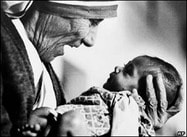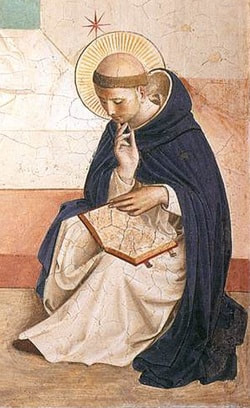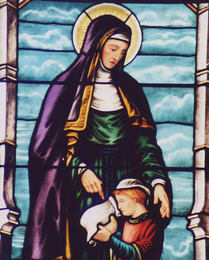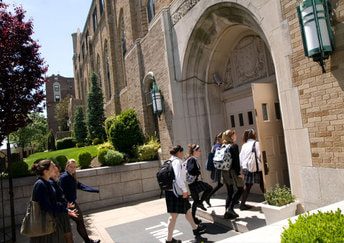|
In 1979, Blessed Teresa of Calcutta, then Mother Teresa, was awarded the Nobel Peace Prize given to “the person who shall have done the most or the best work for fraternity between nations, for the abolition of reduction of standing armies and for the holding and promotion of peace congresses.” Below is a portion of her Nobel Lecture in which she speaks of the joy in her work of enkindling charity and the call we have to pass on this joy to others.  And so here I am talking with you - I want you to find the poor here, right in your own home first. And begin love there. Be that good news to your own people. And find out about your next-door-neighbor - do you know who they are? I had the most extraordinary experience with a Hindu family who had eight children. A gentleman came to our house and said: Mother Teresa, there is a family with eight children, they had not eaten for so long- do something. So I took some rice and I went there immediately. And I saw the children- their eyes shining with hunger - I don't know if you have ever seen hunger. But I have seen it very often. And she took the rice, she divided the rice, and she went out. When she came back I asked her - where did you go, what did you do? And she gave me a very simple answer: They are hungry also. What struck me most was that she knew- and who are they, a Muslim family - and she knew. I didn't bring more rice that evening because I wanted them to enjoy the joy of sharing. But there were those children, radiating joy, sharing the joy with their mother because she had the love to give. And you see this is where love begins- at home… …And I know well that you have not given from your abundance, but you have given until it has hurt you. Today the little children they have- I was so surprised - there is so much joy for the children that are hungry. That the children like themselves will need love and care and tenderness, like they get so much from their parents. So let us thank God that we have had this opportunity to come to know each other, and this knowledge of each other has brought us very close. And we will be able to help not only the children of India and Africa, but will be able to help the children of the whole world, because as you know our Sisters are all over the world. And with this prize that I have received as a prize of peace, I am going to try to make the home for many people that have no home. Because I believe that love begins at home, and if we can create a home for the poor- I think that more and more love will spread. And we will be able through this understanding love to bring peace, be good news to the poor. The poor in our own family first, in our country and in the world.  To be able to do this, our Sisters, our lives have to be woven with prayer. They have to be woven with Christ to be able to understand, to be able to share. Because today there is so much suffering - and I feel that the passion of Christ is being relived all over again - are we there to share that passion, to share that suffering of people. Around the world, not only in the poor countries, but I found the poverty of the West so much more difficult to remove. When I pick up a person from the street, hungry, I give him a plate of rice, a piece of bread, I have satisfied. I have removed that hunger. But a person that is shut out, that feels unwanted, unloved, terrified, the person that has been thrown out from society - that poverty is so hurtable and so much, and I find that very difficult. Our Sisters are working amongst that kind of people in the West. So you must pray for us that we may be able to be that good news, but we cannot do that without you, you have to do that here in your country. You must come to know the poor, maybe our people here have material things, everything, but I think that if we all look into our own homes, how difficult we find it sometimes to smile at each other, and that the smile is the beginning of love. And so let us always meet each other with a smile, for the smile is the beginning of love, and once we begin to love each other naturally we want to do something. So you pray for our Sisters and for me and for our Brothers, and for our Co-Workers that are around the world. That we may remain faithful to the gift of God, to love Him and serve Him in the poor together with you. What we have done we should not have been able to do if you did not share with your prayers, with your gifts, this continual giving. But I don't want you to give me from your abundance, I want that you give me until it hurts. The other day I received 15 dollars from a man who has been on his back for twenty years, and the only part that he can move is his right hand. And the only companion that he enjoys is smoking. And he said to me: I do not smoke for one week, and I send you this money. It must have been a terrible sacrifice for him, but see how beautiful, how he shared, and with that money I bought bread and I gave to those who are hungry with a joy on both sides, he was giving and the poor were receiving. This is something that you and I- it is a gift of God to us to be able to share our love with others. And let it be as it was for Jesus. Let us love one another as he loved us. Let us love Him with undivided love. And the joy of loving Him and each other- let us give now - that Christmas is coming so close. Let us keep that joy of loving Jesus in our hearts. And share that joy with all that we come in touch with. And that radiating joy is real, for we have no reason not to be happy because we have no Christ with us. Christ in our hearts, Christ in the poor that we meet, Christ in the smile that we give and the smile that we receive. Let us make that one point: That no child will be unwanted, and also that we meet each other always with a smile, especially when it is difficult to smile.
0 Comments
Growing up, I often balked at the uniqueness of my name. It was different and I could never find novelty license plates on vacation with my name on it. Although I secretly always appreciated being the only Monica in my class, I sometimes longed to have been named Katie or Laura or Emily, much like most of the girls in my class. At one point, I distinctly remembering yelling out in sheer desperation, “I HATE MY NAME!” because I was unable to procure sparkly pencils that said Monica. With time and maturity, though, I learned to really love my name because it was a part of me and because of the connection to Saint Monica, who has become a spiritual role model to me.
As a young student in my parochial grade school, there was never any doubt as to which saint I would dress up as on All Saints Day. I looked forward each year to wearing the long black dress and black head covering that I associated with my patroness, Saint Monica. At the time, all I knew about her was that she was the mother of Saint Augustine and that she prayed for his conversion, which eventually happened. While we don’t know as much about her as we do about her son, we do know that she was active in her community and Church. She also had a tumultuous relationship with her husband, Patritius, who was a pagan. Throughout their marriage, they struggled with how to raise their children in terms of religion and, it being the 4th century, Monica was unable to have her children baptized as Christians. She probably also didn’t spend much time worrying about finding her name on a pencil. Monica spent most of her life praying for the conversion of her beloved son, Augustine. As he made poor life decisions, Saint Monica worked even harder to help her son know God as she did. She made it her life goal to see him baptized, which eventually happened in the year 387. I am grateful to share my name with a strong, faith-filled woman who spent her time devoted to God and to her family. She has provided an example to me how to remain steadfast in your faith despite what is going on around you, both in your personal life and in the greater world. Saint Monica is an excellent example for those who chose married life as a vocation. Not every marriage is perfect, but it is in that imperfection that we require the support of our partner and, more importantly, we require support from God. Saint Monica took her role as a mother very seriously. She prayed for and wanted her children to know the love of God, as she had. And, in the case of her son Augustine, she did whatever it took, including some tough love at times, to help him find his path to Christ. As we celebrate Saint Monica’s feast day today, let us remember those Saint Monica’s in our life - people guiding our spiritual lives, praying for us along our way, and being there to support us as we discover who we are in the Church, and let us be grateful for the unique aspects of our lives and our personalities that makes us different and special. Monica Thom Konschnik serves as the Administrator for the Catholic Apostolate Center and the Pallottine Seminary at Green Hill. "With all vigilance guard your heart, for in it are the sources of life."
-Proverbs 4:23 When I was first hired to teach at my high school and was told I was going to be teaching social justice, I was very excited. I had learned a lot from different teachers over the years about social justice issues plaguing our society and I wanted to ignite a fire in my students that they could make a difference and impact society. I knew it was going to be a challenging topic to teach, especially to high school students, but I never realized the toll it would have on me. Halfway through my first year of teaching, one of my students handed me a post it note with Proverbs 4:23 written on it. The interpretation she had written was “Above all else, guard your heart. For everything you do flows from it.” It took me some time to realize what she was trying to tell me through this passage, but once I realized what she meant it changed my thinking and my outlook on what I was teaching and the world around me. Some of the topics we cover are racism, prejudice, and poverty. I very quickly realized that in order to make the girls aware of the problems in the world around them, I had to bring in real world examples. At the beginning of every class, my students were invited to bring in news articles or experiences of their own that related back to the topic. I would also research different events or issues myself. After reading and hearing somewhere around 100 different examples of where our society has gone wrong and how we are hurting each other, I began to get a sense of hopelessness. My heart began to hurt because we have so many solutions on how to make our society better, and still nothing ever gets done. It reached a point that I didn’t think society would ever change and I started to stop believing in what I was teaching. Every morning we wake up and turn on the news and see news report after news report of our society tearing each other apart and forgetting the value that each one of us has. That kind of destruction and hurt takes a toll on you; especially your heart, and can make you feel helpless. My student recognized what was happening to my heart and saw me breaking after every news report and life experience I heard in class. She left me this note to remind me that despite the world we are living in, we have to guard our hearts because that is where your drive and spirit comes from. She showed me that if I protect my heart and keep faith and hope in God and the world he created, things could get better. It is really easy to lose faith and hope and have your heart get hurt if you don’t guard it. Once you lose hope and your heartbreaks, everything in your life is affected. Your heart is the center of everything and it drives your life and your passion. If you don’t guard it and keep it safe, you can’t be the best version of yourself. Erin Flynn serves as a high school religion teacher in the Diocese of Brooklyn, New York. Growing up in a farming community in southern New Jersey (yes, New Jersey does have farms, that is why it is called the Garden State), I learned a little something about soil that is good for planting and soil that needs work, sometimes a great deal of work, until planting can happen. Good soil does not just “happen”. There is preparation and proper nurturing, even times of rest so that the soil is best. In his recent encyclical Lumen Fidei, Pope Francis talks about “good soil,”
“In the parable of the sower, Saint Luke has left us these words of the Lord about the ‘good soil;’ ‘These are the ones who when they hear the word, hold it fast in an honest and good heart, and bear fruit with patient endurance’ (Lk 8:15). In the context of Luke’s Gospel, this mention of an honest and good heart which hears and keeps the word is an implicit portrayal of the faith of the Virgin Mary” (Lumen Fidei, n. 58). As we celebrate the Solemnity of the Assumption, we are offered by the Church the great example of the Blessed Virgin Mary, ever-faithful disciple, who witnesses for us the way to live well our baptismal call as disciples and apostles of Christ. “By her complete adherence to the Father's will, to his Son's redemptive work, and to every prompting of the Holy Spirit, the Virgin Mary is the Church's model of faith and charity” (Catechism of the Catholic Church, n. 967). By witnessing faith and charity we live well our baptismal vocation. Our vocation as baptized is our primary vocation. All of the other vocations as married, single, consecrated, or priest are all secondary to this primary vocation as follower of (disciple) and sent by (apostle) Jesus Christ. Each is a way one can live out the primary vocation. How does one decide? Through a process of discernment, one is called to be informed, pray, make a choice, and take action. I make it seem easy. The process is not an easy one, but like making “good soil,” it is necessary in order to make a truly informed choice about how to live our vocation as a disciple and apostle. You might not be ready to make a choice about what way to live this vocation for life, or maybe you have done so already, but living it out as a disciple and apostle is what all of us are called to do. The Blessed Virgin Mary can assist us in our discernment of our apostolic vocation in life and in living it out faithfully and well, truly being “good soil.” May we join together in the prayer of Pope Francis at the conclusion of Lumen Fidei. “Mother, help our faith! Open our ears to hear God’s word and to recognize his voice and call. Awaken in us a desire to follow in his footsteps, to go forth from our own land and to receive his promise. Help us to be touched by his love, that we may touch him in faith. Help us to entrust ourselves fully to him and to believe in his love, especially at times of trial, beneath the shadow of the cross, when our faith is called to mature. Sow in our faith the joy of the Risen One. Remind us that those who believe are never alone. Teach us to see all things with the eyes of Jesus, that he may be light for our path. And may this light of faith always increase in us, until the dawn of that undying day which is Christ himself, your Son, our Lord!" Fr. Frank Donio, S.A.C. is Director of the Catholic Apostolate Center. “Remain in me, as I remain in you. Just as a branch cannot bear fruit on its own unless it remains on the vine, so neither can you unless you remain in me…As the Father loves me, so I also love you. Remain in my love. If you keep my commandments, you will remain in my love, just as I have kept my Father’s commandments and remain in his love. “I have told you this so that my joy may be in you and your joy may be complete. This is my commandment: love one another as I love you.”
-John 15:4, 9-12 I spent all morning getting ready for the ceremony, which didn’t start until three in the afternoon. My hair was swept into an up-do and my makeup was carefully applied. Once I arrived at the church, I stepped into my dress and my dear friend zipped up the back as a photographer snapped pictures. I walked down the aisle carrying a beautiful bouquet. And then, I proudly stood beside my dear friend as she married the love of her life. This June marked the official start of “wedding season” for my friends and me. As an engaged woman myself, I have seen first hand how the wedding industry can sweep a girl (or guy!) off her feet and give her a false sense of what is really important on her wedding day. Just recently, however, I got a glimpse of what a wedding is truly meant to be about: it is about a community of disciples coming together to support and celebrate two of their own as they commit publicly and permanently to living the greatest—and toughest—commandment God has given us. In his farewell discourse as recorded in the Gospel of John, Jesus gives his disciples the last, and the most important, instruction of his earthly ministry: “love one another as I love you.” For Jesus, this love took the form of the incarnation, the passion, and the resurrection. And he asks us, his lowly disciples, to love in the same way? It seems like a nearly impossible task. Jesus recognizes the enormity of what he asks us to do when he says, “Just as a branch cannot bear fruit on its own unless it remains on the vine, so neither can you unless you remain in me.” In other words, we must stay connected to the very source of love—God—in order for us to be able to live out the command to love as God loves. Because Jesus understands that we, as fallen humans, need help in this regard, he sent the Holy Spirit among the disciples and established the sacraments for us, so that we can always have access to the grace that transforms our efforts to love each other into something truly divine. This was evident at the wedding I witnessed this June. My dear friend and her new husband have rooted their relationship in God, which has made their love for each other pure and strong. Both husband and wife were positively glowing throughout the entire day. My dear friend never looked more beautiful, and I’m certain it wasn’t just her gorgeous dress or fabulous hairstyle. There was something inside of her that she simply couldn’t contain: joy. And that joy was contagious. Because they “remained in God’s love,” the marriage of my dear friend and her husband inspired joy in the community that surrounded them that day. As I stood beside my friend as her maid of honor, it felt like my heart was pumping happiness through my veins rather than blood. I’m certain that you will see me smiling from ear to ear in the background of many of her wedding pictures. Seeing someone I love so happy made me happy in return, and gave me twice as many reasons to praise God that day. Moreover, seeing someone I admire receive the grace that she will need to live out her vocation to marriage has made me all the more confident that my fiancé and myself will be able to answer the same call courageously on our own wedding day. Because we are fed by the Holy Spirit in the sacraments, remaining in the community of disciples in the Church will not only keep us connected to the very source of love, but also will multiply our joy so that “it may be complete.” There is a reason why we gather to celebrate when two people who have decided to commit themselves to loving each other as God loves us, and it’s not only because a great party often follows that commitment. When two or three are gathered in his name, God is present and grace and joy abound. Who wouldn’t want to be a part of that? Catherine Wisniewski will begin working as a religion teacher and campus minister at Notre Dame Preparatory School in Towson, Maryland this fall.  This summer, as I drive home, I must pass it. At the traffic light its siren call implores me to come closer. Near the parking lot its gravitational pull draws me in. Often, even several times a week, I succumb, make the right turn, get out of the car, and enter the used book store. Today the Church celebrates my fellow book lover, Saint Dominic. Dominic lived in the early 13th century, when the Albigensian heresy was entrenched throughout Europe. After several lay preaching movements had failed to quell the heresy, and fell into error themselves, St. Dominic formed the Order of Preachers (the Dominicans), an order of priests dedicated to studying and intelligently preaching the Catholic faith. Their studies required books, and thus references to books abound in early Dominican writings: rules for the sharing and care of books, stories of the miraculous recovery of books dropped into a stream, and measures to ensure that all friars are provided with “books and other necessities of life”. Yet, as I’ve discovered through my addiction to the used book store, books can also present temptations. I’d be content to hide behind my growing stack of books for a lifetime. Instead of being charitable, I’d read about charity. Instead of being ready to “account for the hope that is in” me, I’d lift canned arguments from Apologetics books as my hope fades, for hope cannot continue when faith in the person of Jesus Christ is replaced with the mere acceptance of a number of intellectual propositions. “I want the Church to go out onto the streets, I want us to resist everything worldly, everything static, everything comfortable, everything to do with clericalism, everything that might make us closed in on ourselves”. This was Pope Francis’ challenge to World Youth Day pilgrims, but it is the same command that St. Dominic gave to his friars in 1217. The Pope had finally approved the order and the friars probably looked forward to long hours of study, but Dominic had other plans. Against their objections, he sent his friars throughout Europe to preach, saying, “We must sow the seed, not hoard it”. That is the key to Dominic’s charism. His studies were not for his own pleasure, but rather, as the primitive Dominican Constitutions put it, “study ought to tend principally, ardently, and with the highest endeavor to the end that we might be useful to the souls of our neighbors”. Saint Dominic loved books inasmuch as they helped him to love God and neighbor. In a world plagued by heresy, charity led Dominic use his books to instruct the ignorant, but when famine stuck, Dominic did not hesitate to sell his books to feed the poor, for he “could not bear to prize dead skins when living skins were starving and in need". In this year of Faith, we must follow Dominic by deepening our knowledge of the faith. Yet, more importantly we must look to Dominic’s example of how to live it. Matthew Rice is a Junior at the University of Maryland, College Park. He is studying Materials Science and Engineering.
We are living in a moment of grace. Blessed John Paul II of happy memory continually spoke of the need for reviving and renewing the faith. Public life today gives too little evidence of religious convictions or moral principles derived therefrom. They find it difficult to “listen to others speaking of God” (Lineamenta on New Evangelization, 19). Soren Kierkegaard rightly pointed out the present condition of Christendom: “Christendom has done away with Christianity, without being quite aware of it. The consequence is that, if anything is to be done, one must try again to introduce Christianity into Christendom” (Kierkegaard 1941, 39).
The time of St. Vincent Pallotti witnessed revolutions, upheavals, and their consequences like declining of faith and love. In this dangerous and difficult situation, Vincent Pallotti felt the need to do something substantial to restore the image of God in every human person. Pallotti realized that the reparation is entrusted with everyone, using every means available, and aimed at reviving of faith and rekindling of charity. As a result, the Union of the Catholic Apostolate was born in response to the actual needs of the Church and the world. Through the Union of the Catholic Apostolate the laity could participate in the mission and play their role in defending the faith. When faced with similar situations, Pope John Paul II also adopted a method similar to that of Pallotti that is the revival of the faith of the Catholic, and termed it as ‘New Evangelization.’ During his apostolic visit to Poland in 1979, while delivering a homily at Sanctuary of the Holy Cross, Pope used the term, ‘New Evangelization,’ for the first time in history. Then, in 1983, he explained the expression more clearly in the Bishop’s Conference of Latin America. He was not thinking of merely a re-evangelization of the continent, but of a sharing of the faith which was new in its vigor, new in its methods and new in its expressions. The seventeenth General Assembly of the Society of the Catholic Apostolate took the first step to respond to the call of the Church for New Evangelization. The Assembly declared: “To all a new missionary response appeared to be urgent; a New Evangelization which, starting from a common openness to the Spirit, would lead to internal renewal and succeed in giving voice to the hopes of people as active and decisive subjects of their own faith and of their Christian maturity” (In the Union to Evangelize 1992, 15). Declaring thus the Assembly re-emphasized the role of Pallottines in the new missionary endeavor of the Church. For Pallotti, the project of New Evangelization was not just another theme in his life, but it was the centre of God’s will for his life and the goal of his foundations; the real solution for the crisis of his time; the purpose for which all efforts spiritual and temporal were to be directed; the fundamental project that would unite the clergy, religious and laity; and the instrument through which the hope for one flock and one shepherd would be realized. Having seen the impetus of New Evangelization in the charism of St. Vincent Pallotti, we are now in a position to spell out some expressions that Pallottines are familiar with in order to response to the call for a New Evangelization. Catholic Apostolate: Pallotti was convinced of the apostolic character of the entire people of God. Apostolate, therefore, is not restricted to the priestly class alone. Every idea and every suggestion put forward by Pallotti regarding the Catholic Apostolate is reflected in the Decrees of Second Vatican Council that came out 115 years after his death. Instrumentum Laboris on New Evangelization (n. 106) reiterates the participation of various persons (priests, parents, religious and catechists) in the evangelization, each exercising a proper task and responsibility. Pallotti asks everyone: “Can you pray for the salvation of men? Then pray. Can you give good example to others? Then show good example. Can you exhort your neighbor to do good? Then exhort him. Can you contribute something to help the missionary activities? This is how you become an apostle” (OO CC IV, 326). Thus you can be an agent of New Evangelization becoming an apostle yourself. The Cenacle Model: The Pallottine icon of the cenacle is quite capable of responding to the call of the Church today. The little Church gathered in the cenacle is a symbol of an ecclesial vision of communion, where all the faithful feel co-responsible for the mission of the Church and participate in it with equal dignity and right. In this model of the Church, there is no claim for superiority, but all are equal among equals (Gen. Stat. 29a, 31). Today, the churches are caught up in a situation of conflict and struggle within. There are many unevangelical values dominating our churches, for example, power politics, financial ambiguity, growing distance from the poor, excessive institutionalization, and eagerness for fame and recognition. In this situation, the cenacle model invites every Catholic to become an authentic apostle of Jesus for the transmission of Christian Faith. The presence and action of the Holy Spirit will be the hall mark of this project. Love of Christ Urges Us: St. Vincent Pallotti suggested the words of St. Paul as a motto for apostolic work: “The love of Christ urges us” (2 Cor 5:14). In order to be urged and motivated by the love of Christ, we need to be rooted in his love. New Evangelization is not possible without the motivation by the Spirit of Christ. Pope Francis states, in Lumen Fidei, n. 18, that it is the love of Christ that urges the Christians to live their lives in this world with ever greater commitment and intensity. According to Pallotti the love of God and Jesus should impel us to do everything and this must be the soul of any apostolic work. Pallotti emphasized this motto because of the emerging tendency among evangelists to seek prestige, honour and reward here on earth. This motto should lead us to the realization that we are only instruments in the hand of God. Thus, we have a paradigm shift in our approach to Evangelization. As Pallottines we are the ‘chosen’ people for this ministry and our charism impels us do it efficiently. It is the right time for us to respond to the situations according to the charism of our founder. Let the charism of St. Vincent Pallotti be spelled out through the apostolic activities we undertake to the revival of faith and rekindling of charity in the Church and in the world. May our founder St .Vincent Pallotti help us in our response to the call of the Project of New Evangelization. Bro. Shine Augustine, S.A.C. is a member of the Epiphany Province of the Society of the Catholic Apostolate (Pallottine Fathers and Brothers) in Nagpur, India, and is in his fourth year of Theology studies in Prabodhana, Mysore. “Do not worry about how or what you are to speak in your defense, or what you are to say; for the Holy Spirit will teach you in that very hour what you ought to say.” - Luke 12:11-12
“Moses, however, said to the LORD, ‘If you please, LORD, I have never been eloquent, neither in the past, nor recently, nor now that you have spoken to your servant; but I am slow of speech and tongue.’ The LORD said to him, ‘Who gives one man speech and makes another deaf and dumb? Or who gives sight to one and makes another blind? Is it not I, the LORD? Go, then! It is I who will assist you in speaking and will teach you what you are to say.’" - Exodus 4:10-12 I wouldn’t necessarily go so far as to characterize myself “slow of speech and tongue” as Moses does, but I do face certain insecurities when it comes to speaking out (about the faith or any topic). I am a perfectionist. I often hold back from evangelizing out of fear that I will say the wrong thing, or even the right thing but not do it justice. This fear is the reason I prefer writing; I can revise until the text says (almost) precisely what I want. However, I am finding more and more that I am being thrown into situations which do not have space for revision. How can I be sure to respond in a way worthy of my baptismal call? When we volunteered together on a recent Confirmation retreat, my friend gave an eloquent reflection on the person of the Holy Spirit as a gift and an advocate to us and for us. The gifts of the Holy Spirit - including those which precede eloquent speech, such as knowledge and understanding - are truly the gift of the Holy Spirit, the person of the Trinity. We are given God, whom we can call to our side to provide us with whatever strength we currently need... even when we’re unsure what we truly need. St. Paul points out that “we do not know how to pray as we ought, but the Spirit itself intercedes with inexpressible groanings” (Romans 8:26). My friend, who is a high school teacher, found that on the days when he remembered to pray to the Holy Spirit before class, the class had the most fruitful discussions. University of Notre Dame President Emeritus and civil rights champion Rev. Theodore Hesburgh, CSC, repeats the simple prayer “Come, Holy Spirit” hundreds of times throughout the day, in immediate preparation for every situation. If that prayer is good enough for him, it’s good enough for me. While comforting, the Spirit's guidance does not excuse us from all responsibility in developing the coherent response of the Church to the world. St. Peter reminds the faithful that we must "always be ready to give an explanation to anyone who asks you for a reason for your hope" (1 Peter 3:15). Even with the Holy Spirit as our advocate, preparation is necessary. I must be disciplined and conscientious in my study for my upcoming comprehensive examinations. I must continue to grow in prayer, as well as increase my knowledge of my faith and I must be aware of my witness to the faith in word and deed with each person I encounter Yet once the critical moment of speech or witness arrives, just breathe a call to the Holy Spirit and take God’s own Word for it: Do not worry about what you are to say (Lk 12:11). Come, Holy Spirit, fill the hearts of your faithful. Enkindle in us the fire of your love. Send forth your Spirit, and we shall be created, and You shall renew the face of the earth. Laura Berlage holds a M.A. in theology from the University of Notre Dame and currently works as a Pastoral Associate in the Archdiocese of St. Louis, MO. |
Details
Archives
July 2024
Categories
All
|
About |
Media |
© COPYRIGHT 2024 | ALL RIGHTS RESERVED







 RSS Feed
RSS Feed